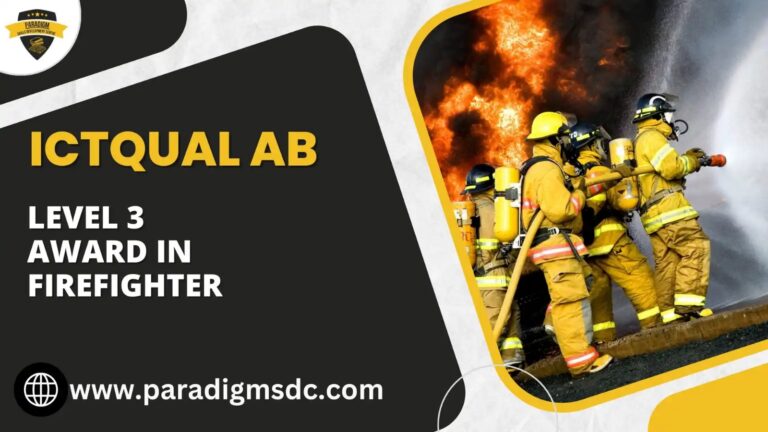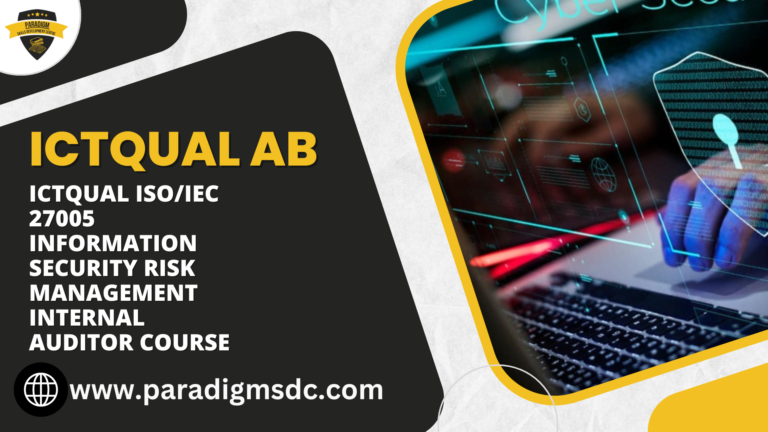Course Introduction
The ICTQual Level 8 Professional Diploma in Environment and Sustainability Management is designed for those aiming to become leaders in the field of environmental management and sustainability. This advanced qualification equips professionals with the expertise needed to develop and implement effective environmental strategies, ensuring sustainable practices across various industries. As global awareness of environmental issues continues to grow, the demand for skilled professionals in this sector is at an all-time high. This diploma offers the knowledge and skills required to meet these challenges head-on.
Course Overview
The ICTQual Level 8 Professional Diploma provides a comprehensive understanding of environmental and sustainability management. The course covers a broad range of topics, from environmental policy and legislation to sustainable resource management and corporate social responsibility. With a strong emphasis on practical applications, the program ensures that students can translate theoretical knowledge into actionable strategies within their organizations.
Course Study Units
The course is structured into several key units, including:
Study Unit 1: Advanced Environmental Policy and Governance
- Overview of international environmental policy frameworks and agreements (e.g., Paris Agreement, Kyoto Protocol).
- Analysis of the role of governmental and non-governmental organizations in environmental governance.
- Examination of emerging trends and challenges in environmental policy implementation.
- Case studies on successful environmental policy initiatives and their impacts.
- Critical evaluation of the effectiveness of environmental governance mechanisms in achieving sustainability goals.
Study Unit 2: Sustainable Resource Management
- Advanced principles of sustainable resource management, including energy, water, land, and materials.
- Assessment of resource depletion, ecological footprint, and carrying capacity.
- Analysis of strategies for sustainable resource extraction, utilization, and conservation.
- Exploration of circular economy concepts and practices.
- Case studies on innovative approaches to resource management in different sectors (e.g., agriculture, manufacturing, energy).
Study Unit 3: Climate Change Mitigation and Adaptation
- In-depth understanding of climate change science, including greenhouse gas emissions, global warming potentials, and climate modeling.
- Examination of mitigation strategies at global, national, and local levels, including renewable energy deployment, carbon pricing, and technological innovation.
- Analysis of adaptation measures to address the impacts of climate change on ecosystems, communities, and economies.
- Evaluation of the social, economic, and ethical dimensions of climate change mitigation and adaptation.
- Exploration of climate finance mechanisms and their role in supporting mitigation and adaptation efforts.
Study Unit 4: Corporate Sustainability Strategies
- Advanced concepts of corporate sustainability, including triple bottom line reporting, integrated sustainability management, and stakeholder engagement.
- Analysis of corporate sustainability frameworks and standards (e.g., ISO 26000, Global Reporting Initiative).
- Examination of strategies for integrating sustainability into business operations, supply chains, and product lifecycle.
- Case studies on leading companies implementing sustainable practices and achieving competitive advantage.
- Critical evaluation of the challenges and opportunities associated with corporate sustainability initiatives.
Research Project: Advanced Topics in Environmental and Sustainability Management
- Students will choose a specific topic within the field of environmental and sustainability management that aligns with their interests and career goals.
- They will conduct a comprehensive literature review to explore the latest research, trends, and debates related to the chosen topic.
- Students will critically analyze the findings and synthesize them into a coherent report, highlighting key insights, gaps in knowledge, and implications for practice.
- The search project will provide students with an opportunity to demonstrate their research skills, critical thinking abilities, and understanding of advanced concepts in environmental and sustainability management.
Learning Outcomes
Upon completion of this diploma, participants will be able to:
Study Unit 1: Advanced Environmental Policy and Governance
- Demonstrate an in-depth understanding of international environmental policy frameworks and agreements, such as the Paris Agreement and Kyoto Protocol.
- Critically analyze the roles of governmental and non-governmental organizations in environmental governance.
- Identify and assess emerging trends and challenges in the implementation of environmental policies.
- Evaluate case studies of successful environmental policy initiatives and their impacts on sustainability.
- Critically assess the effectiveness of various environmental governance mechanisms in achieving sustainability goals.
Study Unit 2: Sustainable Resource Management
- Explain advanced principles of sustainable resource management, focusing on energy, water, land, and materials.
- Assess the implications of resource depletion, ecological footprint, and carrying capacity on sustainability.
- Analyze strategies for sustainable resource extraction, utilization, and conservation.
- Explore and apply circular economy concepts and practices to resource management.
- Evaluate case studies showcasing innovative approaches to sustainable resource management across different sectors.
Study Unit 3: Climate Change Mitigation and Adaptation
- Demonstrate a comprehensive understanding of climate change science, including greenhouse gas emissions, global warming potentials, and climate modeling.
- Critically examine mitigation strategies at global, national, and local levels, including renewable energy deployment, carbon pricing, and technological innovations.
- Analyze adaptation measures to address the impacts of climate change on ecosystems, communities, and economies.
- Evaluate the social, economic, and ethical dimensions of climate change mitigation and adaptation efforts.
- Explore and assess climate finance mechanisms and their roles in supporting climate change mitigation and adaptation initiatives.
Study Unit 4: Corporate Sustainability Strategies
- Understand and apply advanced concepts of corporate sustainability, including triple bottom line reporting, integrated sustainability management, and stakeholder engagement.
- Analyze various corporate sustainability frameworks and standards, such as ISO 26000 and the Global Reporting Initiative.
- Examine and develop strategies for integrating sustainability into business operations, supply chains, and product lifecycles.
- Evaluate case studies of leading companies implementing sustainable practices and achieving competitive advantage.
- Critically assess the challenges and opportunities associated with corporate sustainability initiatives.
Research Project: Advanced Topics in Environmental and Sustainability Management
- Select and define a specific topic within the field of environmental and sustainability management that aligns with personal interests and career goals.
- Conduct a comprehensive literature review to explore the latest research, trends, and debates related to the chosen topic.
- Critically analyze and synthesize research findings into a coherent report, highlighting key insights, gaps in knowledge, and implications for practice.
- Demonstrate advanced research skills, including data collection, analysis, and interpretation.
- Exhibit critical thinking abilities and a deep understanding of advanced concepts in environmental and sustainability management through the development of a well-structured and insightful report.
Course Benefits
- Expert Knowledge: Gain advanced knowledge and skills in environment and sustainability management.
- Practical Skills: Learn practical applications and techniques for real-world environmental challenges.
- Career Advancement: Enhance your qualifications and open up new career opportunities in the environmental sector.
- Leadership Skills: Develop leadership skills necessary for managing sustainability initiatives.
- Networking Opportunities: Connect with professionals and experts in the field of environmental management.
Who is this Course For?
The ICTQual Level 8 Professional Diploma in Environment and Sustainability Management is ideal for:
- Environmental managers and consultants seeking to advance their expertise.
- Sustainability officers and corporate social responsibility professionals.
- Senior managers and executives looking to integrate sustainability into their business strategies.
- Professionals in the public sector involved in environmental policy and planning.
- Graduates with a background in environmental science or related fields aiming for advanced qualifications.
Future Progression
Upon completing this diploma, graduates can pursue several pathways for further career and academic progression:
- Advanced Professional Roles: Take on senior roles such as Environmental Director, Sustainability Manager, or Chief Sustainability Officer.
- Further Education: Pursue doctoral studies or specialized research in environmental management and sustainability.
- Consultancy: Establish your own consultancy practice offering expert advice on environmental and sustainability issues.
- Policy Development: Contribute to the development and implementation of environmental policies at local, national, or international levels.
The ICTQual Level 8 Professional Diploma in Environment and Sustainability Management is a transformative qualification that empowers professionals to lead the way in sustainable practices and environmental stewardship. Enroll today to become a key player in shaping a sustainable future.







